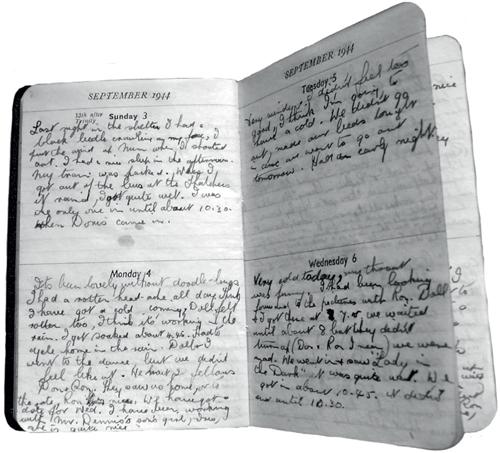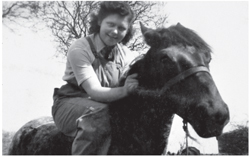Essex Land Girls (10 page)
Authors: Dee Gordon


The Essex WLA Touring Exhibition of March 1943 visited many venues. From
The Land Girl
,
March 1943. (Courtesy of Stuart Antrobus and
www.womens landarmy.co.uk
)
Some wannabe Land Girls found it less easy to be accepted, however. A story that made the national press – and even the front page of the
Daily Mirror
on 24 September 1943 – was the story of Amelia King from John Scurr House in Stepney. Like others, she had been interviewed at the Oxford Street, London, offices of the WLA but been told that farmers would object to ‘her colour’ – Amelia was of African-Caribbean descent. She was latterly informed by the Stratford Labour Exchange in East London that she had been turned down for the Land Army by the Essex County Committee, with no reason being given. Amelia was offered munitions work but, with her father a merchant seaman and a brother in the navy, she wasn’t going to settle for that and took her case to Parliament. The Minister of Agriculture did not feel he could force the Essex branch of the War Ag to accept Amelia, because it seemed that other Afro-Caribbean girls had also been turned away, with the WLA powerless to overcome ‘individual prejudice’. A farmer from Portsmouth came forward and offered Amelia work, although she insisted that she was employed by the WLA, and in this she finally succeeded, having made her point. Defiant, courageous and spirited, what else could the WLA ask of anyone.
The Working Day
Individual Accounts
Rene Wilkinson
In common with so many other Land Girls, Rene learnt a huge range of farming skills. She cut down ‘lucerne’ (also called alfalfa and harvested as hay for livestock fodder), dug ditches, pulled up sugar beet and kale, learnt how to do hedging and thatching, and looked after a pig farm. She worked mainly at Stansted Hall, the estate of Rab Butler MP, with the main house loaned out as a convalescent hostel for the Red Cross:
Pulling kale was unpleasant in the rain [as it grew] six feet high, and I hated picking Brussel sprouts in the snow. I loved fruit picking, though: raspberries, strawberries, blackberries, and working in the orchards with apples, pears and plums which you could add to the four slices you were handed for your lunch.
She remembers ‘working with East Enders who believed cows to be bulls because they had horns’ and that she had to drive ‘through the airport [Stansted] every morning, and saw the damaged aircraft’. It was the Americans who ‘provided waste food for the pigs’, but when ‘they showed any interest in the girls [in the hostel], Mrs Dover drove them away’. Her main memory of the pig farm was ‘the smell’ which she had to ‘wash off at the hostel’s ablutions before eating’ in the evening. Rene also recalls learning to use threshing tackle (the forerunner of the combine harvester) ‘with a steam roller, which was always breaking down’, but any downside was offset by ‘getting a good suntan’.
Betty Shaw
After working at a poultry farm, Betty took the ‘opportunity to work at Lord Rayleigh’s farm’ in Little Baddow because she had ‘some milking experience’, and there she helped ‘milk 220 cows every day’ with her friend Belle, an Australian. She added more skills – ‘all cowshed work including calving’ – before the army apparently ‘took the farm and the house’ meaning that she ‘moved to a bigger farm nearby, with 80 cows, eight milkers and first class cowsheds’.
The working day was ‘5 a.m. to 5 p.m. with a break for breakfast and dinner’. Betty ‘lodged at Danbury with an elderly couple’ and ‘cycled the 1½ miles each morning and evening’ even when there was ‘firing all around’. However, when her dad moved back to Leeds, she transferred to York and ended up in the Timber Corps.
Mary Marsh
Another dairy worker, Mary, was at Sewardstone Hall Farm in Epping ‘milking, mucking out, caring for calves, feeding calves, and looking after poultry’. She shared a large bedroom at the hall with five Land Girls (in three double beds). ‘We would be up at 4 a.m., a wash in cold water with jug and basin, no bathroom facilities; there was an outside loo. Tea in a thermos [was] saved from the night before, with a hunk of bread and dripping before milking, starting at 4.30.’ She also worked on Harlow Common at harvest time, and was one of those responsible for clearing land in Epping Forest prior to its cultivation. In complete contrast, Mary also had to contend with greenhouse temperatures in excess of 100 degrees when caring for tomatoes and cucumbers.
Dorothy Jennings
Although Dorothy (or ‘Doll’) kept diaries during the war years, these were a) tiny, and b) preoccupied with thoughts about teenage boys – as they would be! However, there are some insights into her working day at a variety of farms around Essex, when she lived at a number of different hostels:
7.9.43 | First day trimming [hedges?], all on my own. Frightened and fed up. |
15.9.43 | Muck spreading today, not a bad job, makes your arms ache though. |
17.9.43 | Hoeing mangles [ |
4.10.43 | Hoeing cabbages again. |
7.10.43 | Didn’t like cutting cabbages much. They were soaking wet. |
9.10.43 | Weeding this morning. Rotten job. Mr Algie, the farmer, moans a lot. |
23.10.43 | Picking beans in the rain. Picked some for myself … had enough for dinner. |
5.11.43 | Tony gave me a mouse to hold. We wave to the lorries as they go by. |
9.11.43 | First ride on a tandem. |
29.11.43 | Started burning wood and then we had to sack chaff. Had quite a lark. |
2.12.43 | Working at land clearing. Vic and I were pulling a tree up and we both fell backwards into a puddle. |
17.12.43 | We had to pick-axe stumps of trees out, tired us out. |

Dorothy Jennings’ (née Foster) extract from 1944 war diaries. (Courtesy of the Marion Dowling collection; image by author)
20.12.43 | Learnt to ride a bike – fell off. |
29.12.43 | Hedging and chopping down trees. Not a bad job. |
4.1.44 | Mud slinging at Clay Tye [Upminster] this morning: freezing. |
11.1.44 | Sawing wood. |
17.1.44 | Should have been mud slinging but refused and went hedge trimming along side of road. |
31.1.44 | Hedging and then filling in bomb holes at Clay Tye Farm. |
4.2.44 | Hoeing the clover. |
25.2.44 | Ditching and baling. |
22.3.44 | Dug up parsnips and onions. |
3.4.44 | Cut cabbage, pulled onions and planted spuds and sweated. |
5.4.44 | Cut cabbage, then spinach, and went spudding. |
24.5.44 | Weeding leeks, and you want your glasses on to see them. |
11.7.44 | Picking spuds again. |
12.7.44 | Too tired to go out. |
17.7.44 | Pulled onions and harrowed spuds. |
25.7.44 | Fed up hoeing leeks. |
4.8.44 | Built a stack – hard work – boy, did I sweat – I was filthy dirty. |
17.8.44 | Pulling harvest onions. |
22.8.44 | Drizzled all the time. I was thoroughly miserable pulling onions. |
13.9.44 | Picked spuds then onions. My hands get ever so rough. |
15.9.44 | Picked spuds. Blackberrying. |
10.10.44 | Had the job of walking behind the digger, then hoeing, then riddling [sorting potatoes]. |
Barbara Rix
At Red House Farm, Wix, Barbara started milking forty cows at 5.30 a.m., having left her billet at 5 a.m. She used to think:
When this war is over, I will never get up before 8 a.m. I had hoar frost on my eyebrows … The farmer spent a lot of time in bed and I had to throw stones at his window to get him up; often ended up getting the cows in without him, even in cold and miserable weather. The cows usually came when called, except one morning they didn’t budge and I had to go and get them … [I did the] milking by machine, and had to start the engine in the mornings and had trouble getting it to work. After the cows, I helped the men in the fields cutting kale etc. It was a dairy – Friesians and red polls – and agricultural farm.
Other jobs included:
… mucking a field with a tractor with the farmer’s son on the back on the trailer, although he fell off after my first load and I didn’t notice until I was at the end of the field, and I had to go back for him. It was a big old Fordson and I drove it a lot … in the evening were the cows again and, during harvest, back again to the fields … I sat in the back [of an old car on the farm] while the farmer shot rabbits, and I had to collect them, but I didn’t like doing it. They weren’t particularly pests, but useful for meat, and you could sell them to butchers or use them for bartering.
She remembers the farmer saying on her first morning that ‘a good wind could blow you away’, but he was very kind, although the ‘men on the farm did laugh when my boots got stuck in the mud and came off’. Barbara also spoke of a ‘friend sent to hoe sugar beet, which had swedes in between, and she didn’t know so she hoed them up as well’.
Kathleen Firmin
Another Land Girl who spent most of her two years’ service in one place, Kathleen lived and worked in South Woodham Ferrers. She worked ‘on a small-holding helping with the bullocks, feeding them and fattening them up, shedding a few tears when it was their time to go’. There were ‘three other Land Girls and other farm workers’ on site. As she had some tractor training, she did ‘a lot of ploughing’ work, but also ‘pulled veg’.
Mary Page
I helped with the chickens and hay making. In the summer it was so hot that some of the girls would pull down the top of their dungarees and work in their undies, but they burnt terribly in the sun. One of my favourite jobs was cutting hay with the horses … Suffolk Punches. I drove the machinery. One day when I had a terrible thirst, a local man told me to go down the hill where there was a spring, so I cupped my hands and have never tasted anything so beautiful.

Mary Page and equine companion. (Courtesy of the Braintree District Museum Trust)
At one stage, she worked with a ‘Guernsey herd’ at Mr Wisbey’s farm in Pebmarsh:
I had to be ready for work at 6 a.m., then went home [the billet next door] for breakfast. Then I did a twelve-mile milk round with the pony and cart around Twinstead, Alphamstone, etc. returning at 12.30 to wash the bottles and sterilise them before going ‘home’ for lunch. In the afternoon, I was milking again and other duties.
